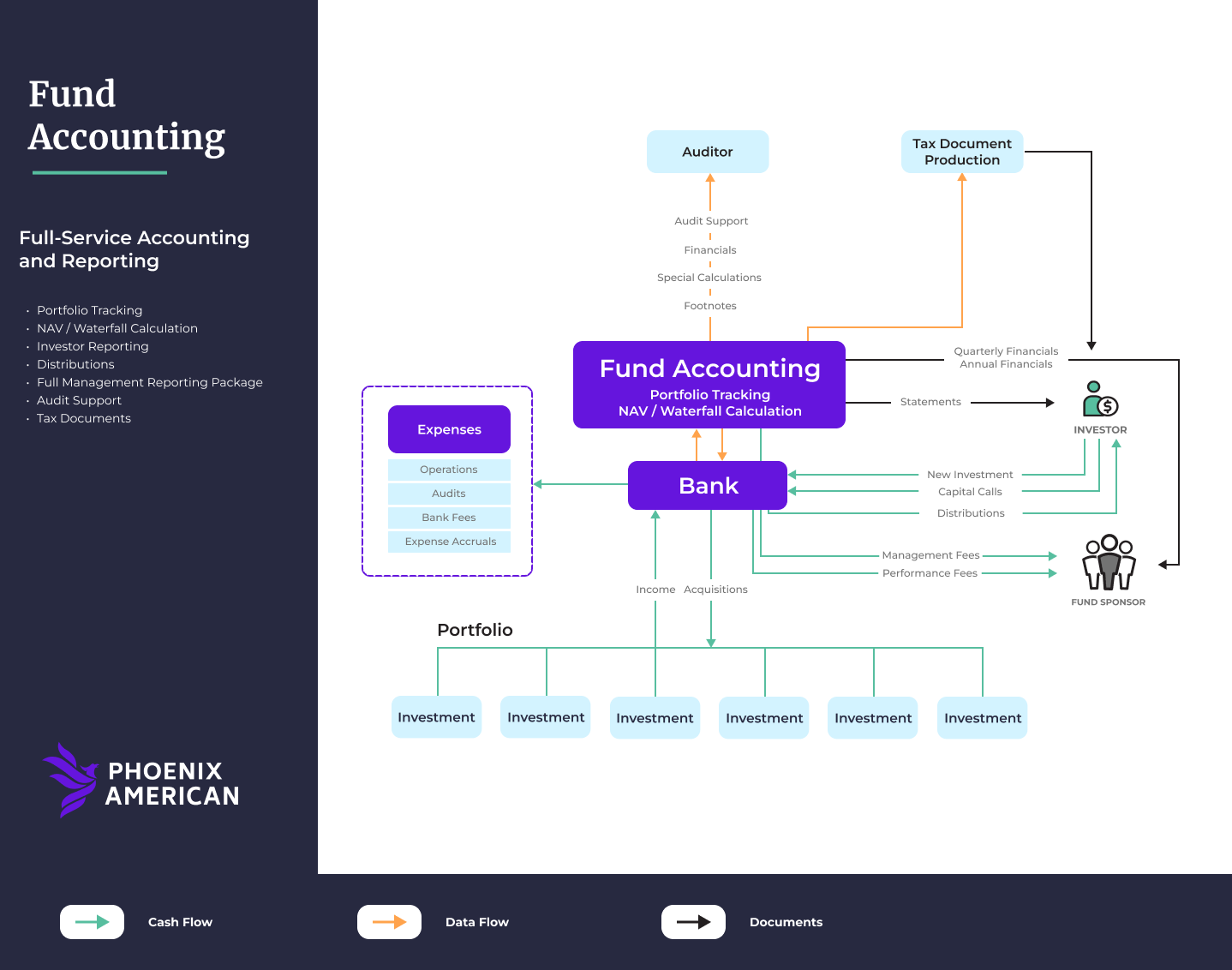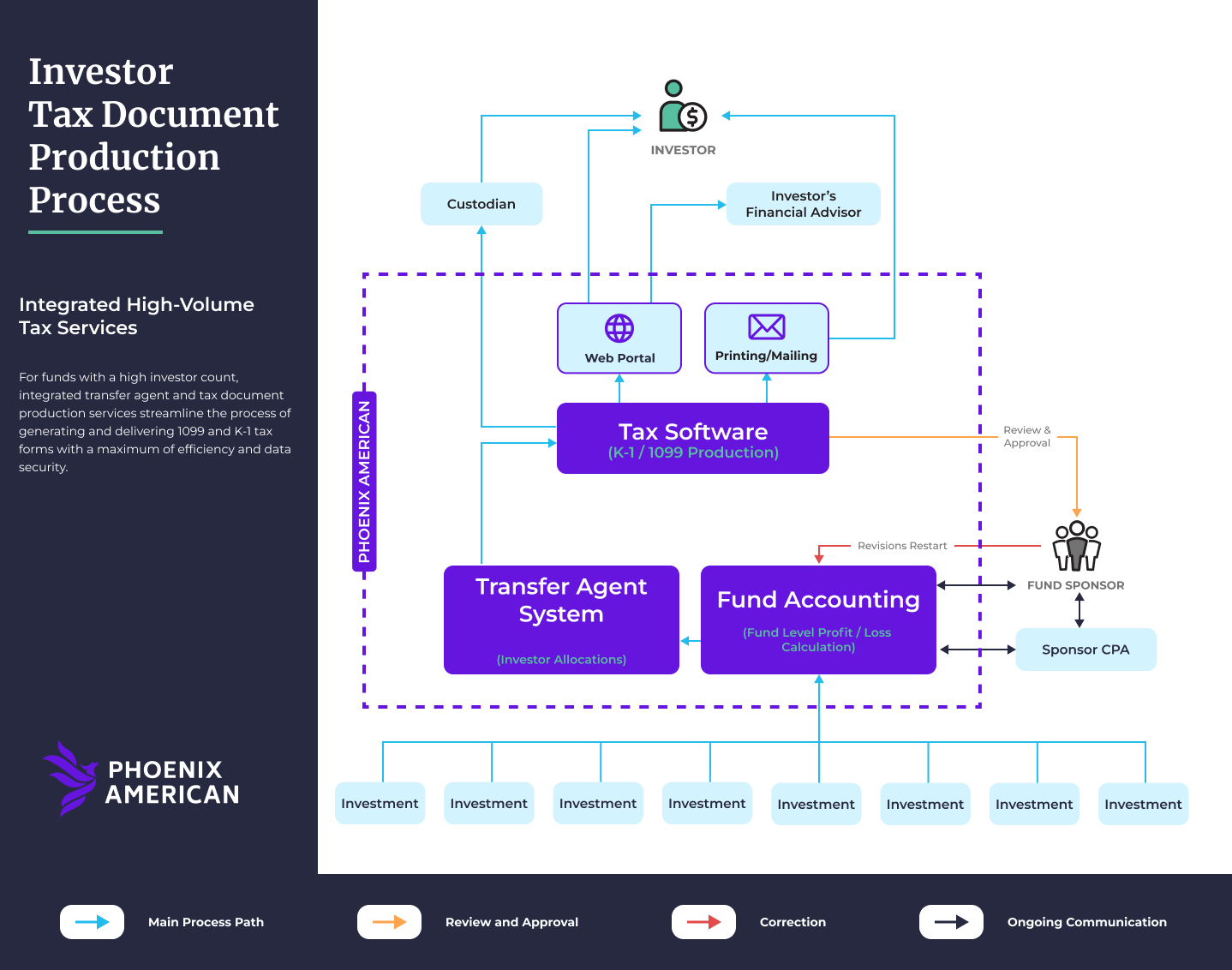Fund accounting is a detail-oriented, deadline-driven role designed to streamline back-office administration for an investment fund so that fund management can concentrate on its core tasks of fundraising and the acquisition and management of portfolio assets. With the right fund accounting partner, an investment fund can rely on systematic day-to-day tracking of portfolio investments, their income, expenses and changes in value, cash flow in and out of the fund, management of investor needs and interaction with auditors and regulators. Fund accounting will produce ongoing reporting that monitors the vital statistics of the fund, supports investor information needs, aids the production of tax documents and simplifies audits and regulatory filings.
Throughout the life of your investment fund, your fund accounting provider will be the keeper and curator of all the essential data regarding your portfolio, its investors and your obligations to both.
The fund accounting task begins even before the launch of the fund with detailed planning and preparation of the necessary infrastructure so the fund will operate both in accordance with the commitments and requirements of the fund formation documents and with the desired day-to-day workflow of fund management. Customization of fund accounting and fund administration software as well as a clear designation of roles, responsibilities and expectations for both fund accounting and management sets up the fund to operate smoothly.
Once the fund has gone live, as investors are admitted to the fund, money is coming in and assets are being acquired – fund accounting will conduct a review of the processes and workflow established in the initial set up and implement adjustments, as needed, to accommodate operational reality. Is cash coming in through the right channels? Is investment data complete and correct? Are subscription documents in good order: contact information, investor tax status, side letters? Are any unique calculations necessary that fund accounting should prepare for? Is the deployment of capital changing the structure or flow of funds in any way? Do sub-entities or blockers need adjustment? Fund accounting will be able to tell if it will be necessary for management to revisit the setup process or even draft amendments to the LPA or LLC agreement to accommodate how it is now known the fund is going to work.
As the fund proceeds through its life cycle, fund accounting sees to day-to-day maintenance of the investment portfolio, the flow of cash both in and out of the fund, investor relations needs and compliance matters. Fund accounting logs portfolio assets as they are acquired with ongoing tracking of accruals and expenses. Fund accounting conducts capital calls for committed funds as they are required. Distributions are calculated and paid to investors by fund accounting according to investor allocations on the schedule delineated in the offering documents. Waterfall calculation and payment is a key task of fund accounting. Management compensation waterfalls can be complex and confusing to some investors so specialized reporting is provided if necessary by fund accounting to make these calculations clear and simple to understand.
Fund accounting periodically calculates net asset value (NAV) conjunction with the provider of asset valuations and reports to investors as scheduled. Reporting on assets, income, expenses and investors is provided to management regularly, as established in the setup process, to support business strategy review, audits, regulatory filings and new investment sales planning. Fund accounting interacts as needed with auditors and will work collaboratively with management on the notes section of audit reports if necessary. Fund accounting will manage data with an eye to tax season so that the preparation of investor K-1s or 1099s occurs promptly after the first of the year. Tax document preparation capability integrated with the provider’s fund accounting software preserves data security and streamlines production so that no investor is forced to extend tax filing due to the lateness of a tax form.
Throughout the year, fund accounting will recommend keeping an eye on certain metrics to monitor risk and adherence to investment strategy: debt to equity ratios, expense ratios, blocker level expense allocations and others. These will vary depending on the nature and strategy of your fund and specialized reporting provided by fund accounting will keep you apprised of these essential components of fund performance.
Fund accounting will have additional tasks during the liquidation phase of the fund. The wind down process of a fund will depend on market conditions, management outlook, the vintage of the fund and other factors. An orderly wind down might take a year to 18 months. If management determines it is a particularly good time to sell portfolio assets the process may be accelerated. The pace of a wind down depends on the asset, the performance of the portfolio and the expectation of investors. The maturity of the fund is a factor. If investor funds have already been locked up for the anticipated time frame, it may be decided to liquidate regardless of other factors.
As the wind down process progresses, fund accounting will evaluate whether the way the fund has been operating still makes sense. Is the expense structure still justified as the assets under management declines? Administration fees and charges from other vendors might now be excessive for the smaller and shrinking fund. Do any adjustments or renegotiations need to occur? Fund accounting will now begin assembling all the information necessary for the wind down of the fund and look closely at any potential sources of complication. Are there any distribution checks to investors that never cleared? After calculation of final distributions, do all investor account balances go to zero? Does the final distribution zero out the fund? Are there any other charges, accruals or expenses that need to be cleaned up? Fund accounting will identify any discrepancies that will have to be investigated and resolved.
Final invoices from auditors and other vendors will likely come in after portfolio liquidation and final investor distributions. Will these invoices be paid by the general partner or will a reserve be kept for payment of trailing invoices? Fund accounting will make all necessary investigations and inquiries and seek decisions from management to reach a clean closure of the fund.
From beginning to end, your fund benefits in every detail from the experience and attention to detail of your fund accounting provider. Experience with multiple structures, assets and offering types enables fund accounting to customize solutions to streamline portfolio, cash, investor and auditing matters, foresee and avoid potential problems and empower you to most effectively raise new capital and maximize investment returns.





